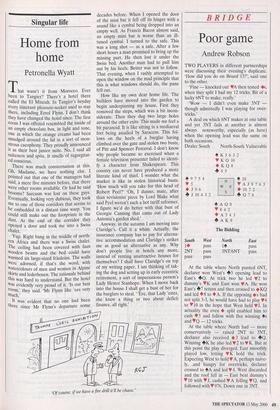BRIDGE
Poor game
Andrew Robson
TWO PLAYERS in different partnerships were discussing their evening's duplicate. `How did you do on Board 13?', said one to the other.
`Fine — knocked out VA then tested 4s, when they split I had my 12 tricks. Bit of a lucky 6NT to make, really.'
`Wow — I didn't even make 3NT though admittedly I was playing for over- tricks.'
A deal on which 6NT makes at one table and yet 3NT fails at another is almost always noteworthy, especially (as here) when the opening lead was the same on both occasions.
Dealer South North-South Vulnerable 6 K J 6 3 2
✓ K Q 10 ♦ K Q 8 • 8 5
4 9 7 5 4
♦ 5 ♦ J 9 6
• J 10 4 3 2 South West 1• pass 2NT pass pass pass
N
W E
S
410
♦ A J 9 7 6 3 ♦ 1072 4 Q 7 6
4 A Q 8
• 8 4 2
♦ A 5 4 3
f A K 9
The Bidding North East 1+ pass 3NT/6NT pass At the table where North punted 6NT, declarer won West's 43 opening lead to East's 40. At trick two he led V2 to dummy's VK and East won VA. He won East's 47 return and then crossed to ♦KQ and led ♦8 to ♦A. If the opposing ♦s had not split 3-3, he would have had to play V4 to •10 in the hope that West held VI In actuality the even ♦ split enabled him to cash ♦5 and follow with five winning 45 and ♦Q — 12 tricks.
At the table where North had — more conservatively — raised 2NT to 3NT, declarer also received ♦ 3 lead to 40. Winning 4K he also led V 2 to V K. But at this point the play diverged. East smoothly played low, letting r K hold the trick. Expecting West to hold A, perhaps naive- ly, .and hungry for overtricks, declarer crossed to 4A and led r 4. West discarded and the roof fell in — East beat dummy's 1,10 with r J, cashed V A felling V 0, and followed with V 976. Down one in 3NT.


























































 Previous page
Previous page